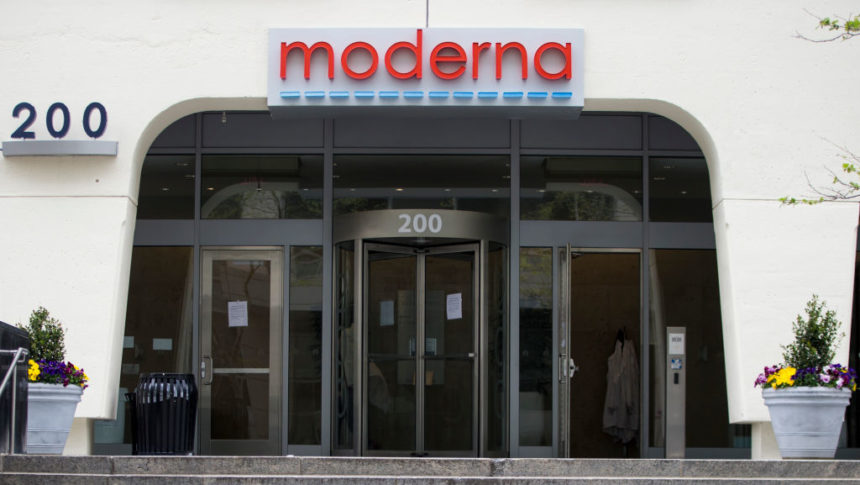Amid growing calls for wealthier nations to help make vaccines more widely available worldwide, Moderna and the National Institutes of Health find themselves immersed in a dispute over credit for a COVID-19 vaccine patent.
Moderna’s mRNA vaccine was developed as part of a collaboration between the company and the NIH – in particular, the agency stressed, with the aid of three scientists at its Vaccine Research Center. The agency, which claimed its scientists worked with Moderna to create the genetic sequence component of the vaccine, is arguing that they should be identified as co-inventors on the patent application.
Moderna, however, has pushed to leave the NIH scientists off the patent. In July, the company said in a filing with the U.S. Patent and Trademark Office that it had “reached the good-faith determination that these individuals did not co-invent the mRNAs and mRNA compositions claimed in the present application.”
The dispute has come to light amid continued concern over vaccine equity. In theory, if the NIH is listed as co-inventor on the vaccine patent and given the right to license the mRNA technology, the federal government will have more of a say in how that vaccine is manufactured in other countries. While the Biden administration has pledged to donate a billion vaccine doses to countries in need, the government has limited leverage over the pharma industry.
According to John Moore, professor of microbiology and immunology at Weill Cornell Medicine, it’s nearly impossible to discern Moderna’s exact motivation behind the decision to leave NIH scientists off the patent. That said, he noted that, historically, “Patent disputes almost always come down to money. Presumably, the company sees financial gain in what it’s doing.”
Moore added that the longer-term implications of the dispute are similarly unclear. It’s safe to say, however, that it signals a fissure in the relationship between Moderna and the federal government, which have been working together since 2016.
“What it represents is damage to a relationship that’s been going on for multiple years,” Moore explained. “If the company’s doing that, it has to have a reason – and the reason is almost always financial when you’re dealing with the pharma industry.”
Moore added that he isn’t especially surprised: “It’s been known in my circles for most of the year that the relationship has been difficult.”
Though the pandemic-era timing of the Moderna/U.S. government dispute may be unfortunate, fights over patent rights – and an acknowledgement of their wide-reaching implications for public health – aren’t entirely uncommon.
In 2019, the Centers for Disease Control and Prevention and Gilead tussled over an HIV drug treatment developed with $50 million in federal grants. Gilead argued that the government’s patents for the treatment, Truvada, were invalid. The Trump administration sued Gilead; the lawsuit is pending.
“There is always tension between government-funded science, which funds work at the NIH but also work in the academic community, and the pharma industry,” Moore stated flatly. “The pharma industry often takes advantage of published information. Sometimes it’s more significant and leads to patent disputes. This is not a unique occurrence.”
The Moderna/NIH dispute is contentious due to the raging disparities in global vaccine access. Only 4.2% of people in low-income countries have received at least one dose of a COVID-19 vaccine as of early November, according to Our World in Data. In some African countries, that percentage is under 2%.
In recent months, advocacy groups and international organizations have called on wealthy nations as well as vaccine makers to make doses more widely available to low-income countries, through pathways like waiving intellectual property rights.
According to U.S. State Department coordinator for global COVID response and health security Gayle Smith, there is only so much the federal government can do to encourage companies like Pfizer or Moderna to increase access to their vaccines. “I think it’s more ask than tell, but I think there are ways to ask with enthusiasm,” she said during a recent interview with NPR.
In a letter addressed to NIH head Dr. Francis Collins, Peter Maybarduk, director of the Access to Medicines Program at Public Citizen, urged the agency to affirm its position as co-inventor of the Moderna vaccine. The letter highlighted “huge gaps in global vaccine access” and a need for the federal government to “assert more control over this technology.”
“Because co-inventorship creates a presumption of co-ownership, this series of exclusions could have important public health consequences if and when the patent applications mature into issued patents around the world,” the letter continued. “We urge you to publicly reclaim the foundational role of the NIH, and use your leverage to champion global vaccine access.”
In an October 2020 statement, Moderna noted it would not enforce its patents on anything COVID-19-related, citing “a special obligation under the current circumstances to use our resources to bring this pandemic to an end as quickly as possible.” But it’s not evident to what extent Moderna plans to eliminate perceived IP barriers.
Moore stressed again that it’s unclear whether Moderna’s attempts to exclude NIH scientists from the patent have anything to do with the pressure to increase vaccine equity. He noted that the company’s response over the next few months should be telling.
“Words are easy, but actions count,” Moore said. “It’s easy for companies to make public statements about what they’re going to do and how they’re serving mankind. You have to judge not by press statements, but by what they actually do.”








